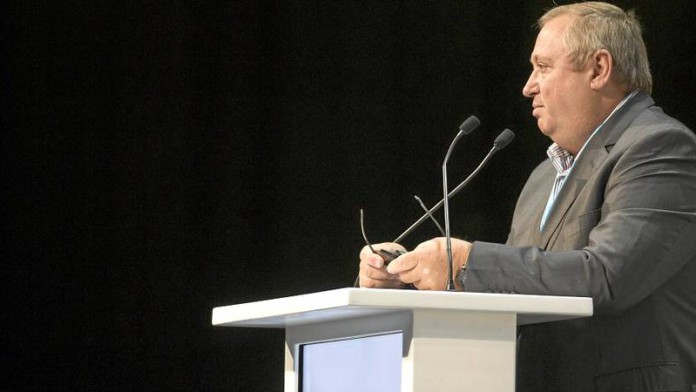
NEAL Froneman, CEO of Sibanye-Stillwater, promised shareholders a new era of cash returns as the R135bn precious metals miner sought to rekindle its reputation as a high-yielding dividend payer.
Responding to questions following presentation of record interim earnings, Froneman said the company’s strategic intention was to improve its share rating. This would be best achieved by establishing a track-record for dividends, a process that would take a year to 18 months – or “two to three dividends”, as Froneman put it.
Dividends would be prioritised over growth by acquisition.
However, Froneman – who is long renowned for blockbuster dealmaking – could not completely dismiss the prospect of a new transaction, possibly by buying a battery minerals producer that would complement the firm’s successful four-year foray into platinum group metals (PGMs). He also expressed an interest in growing the firm’s gold portfolio, although not in the current rarefied price environment.
“If we cannot create more value, then we will return it and we would exceed our dividend policy,” he said, referring to its former practice of paying out 25% to 35% of earnings before interest, tax, depreciation and amortisation (EBITDA), reinstated today.
Sibanye-Stillwater today announced an interim payout of 15% of EBITDA, slightly lower than the planned long-term dividend policy, in recognition of the uncertain economics of the Covid-19 pandemic.
“I suggest we will see a significant re-rating. We are rated well below our peer group and we know why we are there,” Froneman said in reference to major debt the group incurred in 2016 following the $2.2bn purchase of Stillwater Mining, a palladium miner. A flurry of follow-up deals were completed between 2017 and 2019 including the all-share purchase of Lonmin and DRDGOLD, a gold waste re-treatment company.
BALANCE SHEET
The depreciation of the rand gave additional lift to increased dollar pricing for PGMs and gold. As a result, the basket price of South African produced PGMs increased in the six months ended June by 98% year-on-year.
This enabled Sibanye-Stillwater to reduce net debt 38%, or some R5bn, to R16bn, and take net debt to EBITDA ratio to 0.55x, well below its 2.5x covenants installed by lenders. Net deb to EBITDA could be reduced to 0.22x were Sibanye-Stillwater to redeem or convert a $354m convertible bond that matures in 2022. The group had a ‘soft option’ over the bond that was currently in the money and could be exercised from October.
Gross debt of about $1.6bn (R28bn) as of June 30 could be reduced to $1bn over time. “We would be comfortable with that [gross debt number] through the cycle,” said group CFO, Charl Keyter.
With gold and PGM production heading towards 100% by the fourth quarter and higher average rand gold and rand basket PGMs prices, the outlook for second half cash generation was extremely promising, the group said. “I believe you can expect a significant dividend based on our full year results if prices hold up,” said Keyter during the presentation.
Based on its market consensus analysis, Sibanye-Stillwater said it was trading on massive discounts on nearly every investment metric including enterprise value to EBITDA, and market capitalisation.
SOUTH AFRICA
Froneman hit on familiar ground lambasting the South African government’s investment policies which he said were designed to dissuade and deter despite “… our wonderful (mines) minister (Gwede Mantashe)”.
Plans to develop previously shelved gold and platinum deposits in South Africa – such as the Burnstone (gold) project and the K4 (PGM) project – were frustrated by “… how bad South Africa is at the moment,” he said.
A government condition placed on the sale of assets by AngloGold Ashanti to Harmony Gold was “… very sad and completely inappropriate for investors”, said Froneman.
It emerged last week the South African government had approved the sale of the Mponeng and Mine Waste Solutions gold assets for $300m provided AngloGold retained its primary listing on the Johannesburg Stock Exchange and that it did not re-domicile its Johannesburg central headquarters. “I hope government takes note that this is not the right thing to have done,” said Froneman.
The Minerals Council South Africa, the mining sector organisation of which Froneman is a vice-chairman, said today that a letter written by South African president, Cyril Ramaphosa, over the weekend criticising ruling party ANC corruption had to be supported by action, such as charging, and jailing proven perpetrators.







